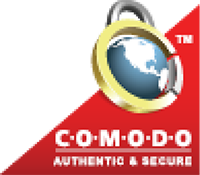Two of the most popular budget-oriented SSL certificates clash it out: Comodo SSL vs RapidSSL
If you’re looking for the best bang-for-your-buck domain validation (DV) SSL certificate, you’ve come to the right place. With an endless number of certificate authorities (CAs) offering SSL certificates at outrageous prices — and some even being issued by unauthorized entities — it’s important that you’re aware of the CAs that have a proven track record and high reliability rates, such as RapidSSL, Symantec, GeoTrust, and Comodo CA (now known as Sectigo) — just to name few. In this article, we’re going to compare RapidSSL vs Comodo in this article to highlight the benefits of each.
As to be expected, established brand names come with higher price tags. Some SSL certificates can cost as much as $1,000 for an extended validation (EV) SSL certificate when you purchase them from the CAs directly instead of a licensed reseller such as RapidSSLonline, which offers some of the cheapest rates for various brands’ SSL certificates.
Save Up to 82% on DV SSL Certificates
Protect your website within minutes with a domain validation SSL certificate.
Comparing Comodo SSL vs RapidSSL DV SSL Certificates
Among the many SSL certificates on the market, Comodo SSL and RapidSSL both offer domain validation certs at affordable prices when compared to other sources. Below is a description of each certificate, their strengths and weaknesses, as well as a chart that shows a more in-depth look at both certificates and how they stack up against each other.
Comodo SSL
Comodo is one of the largest CAs in the world, with decades of trust under its’ name as it was founded more than 20 years ago. That trust comes at a price, though, as their Comodo SSL certificates are significantly more expensive than their counterparts, despite offering the same level of authentication, encryption, and many of the same features. Comodo SSL certificates are also accepted by 99.9% of web and browsers, ensuring that visitors feel safe in your safe.
RapidSSL
RapidSSL is a brand under the DigiCert/Symantec family, which is aimed towards those who need basic protection for their website while retaining affordability. The RapidSSL Certificate not only offers most of the features that the Comodo SSL Certificate offers, but it does so at a quarter of the price of the Comodo SSL Certificate. Is RapidSSL safe? Of course, they are. RapidSSL Certificates are also trusted by 99.9% of web browsers, allowing your visitors to safely browse your site at a minimum cost.
RapidSSL vs Comodo SSL – An In-Depth Breakdown
| Comparison | Comodo SSL | RapidSSL |
| Brand | Comodo | RapidSSL |
| Validation Type | Domain Validation | Domain Validation |
| Site Seal |   |   |
| Domains Secured | One | One |
| Server Licenses | Unlimited | One |
| Issuance Times | Minutes | Minutes |
| Encryption Strength | 256-bit | 256-bit |
| Browser Compatibility | 99.9% | 99.9% |
| Warranty | $250,000 | $10,000 |
| Refund Period | 30 Days | 30 Days |
| Price | Starting at $50.38/yr. | Starting at $12.42/yr. |
| Buy Now |
RapidSSL vs Comodo: Is There Any Difference Between Their DV SSL Certificates?
Truth be told, there is very little difference between the RapidSSL and Comodo SSL certificates. All the core features such as the encryption strength offered, the number of domains secured, and issuance times for certificates are identical. However, the RapidSSL certificate costs nearly one-quarter of the price of the Comodo SSL certificate — starting at just $12.42 per year. This makes it clear that RapidSSL is a better value than Comodo SSL overall.
The biggest determining factor is whether you want to pay for the extra warranty that the Comodo SSL certificate offers, as $10,000 may not be enough coverage if your business is on the larger side of the spectrum.
Related Resources
- What is Wildcard SAN Certificate and What Are Key Advantages?
- Top Trusted Certificate Authority/CA List Explained
- SHA1 vs SHA2 vs SHA256 – What’s the difference?
- Compare RapidSSL Vs. Comodo Vs. Godaddy Vs. GlobalSign SSL Certificates
- Do I Need SSL for WordPress?
- How Much Does an SSL Certificate Cost?
- Secure Multiple Domains with One SSL Certificate
- What is an SSL Stripping Attack — Explained by SSL Experts







